2014 Third Quarter Economic Outlook is UP
Robins School of Business – Virginia Council of CEOs survey shows highest level of optimism in four years.
Each quarter the Virginia Council of CEOs (VACEOs) and University of Richmond’s Robins School of Business partner to take the pulse of top executives in the region.
The survey results provided by Richard Coughlan, Senior Associate Dean at the Robins School of Business, provide a snap shot of the overall economic outlook index for various companies within the region and help central Virginia companies anticipate business decisions and plan for growth.
The third quarter 2014 CEO Economic Outlook survey by the University of Richmond’s Robins School of Business and the Virginia Council of CEOs finds strong optimism among chief executives in central Virginia. The survey’s Economic Outlook Index, launched in mid-2010, reached an all-time high this quarter.
Says Scot McRoberts, executive director of the Virginia Council of CEOs, “These results are not surprising. With economic growth over 3 percent in three of the last four quarters, and a forecast of steady growth in 2015, CEOs are investing in the human and capital resources that will allow them to grow.”
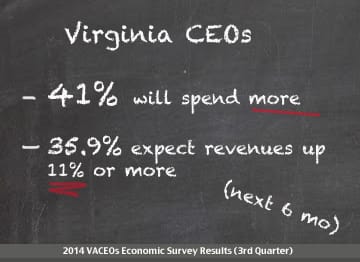 Virginia CEOs Project Revenue, Spending and Staff to Increase Significantly in Next Six Months
Virginia CEOs Project Revenue, Spending and Staff to Increase Significantly in Next Six Months
Among the 65 chief executives of small and mid-sized companies participating in the survey this quarter, more than two-thirds expect their revenues to grow over the next six months, with 35.9 percent of respondents expecting revenues to climb by 11 percent or more. There was also a significant increase in the percentage of CEOs who expect to boost capital spending over the next six months, with 41.5 percent planning an increase this quarter compared to just 28.7 percent of respondents last quarter.
For the second consecutive quarter, respondents were asked whether finding, hiring and retaining talent was a significant issue; 78.5 percent of CEOs indicated it was a concern, an increase from 70 percent of respondents last quarter. According to the executives surveyed, the most difficult positions to fill are in operations, cited by 31 percent of respondents, and sales, cited by 23 percent of respondents. When asked how much their annual revenues might increase if their talent concerns were resolved, nearly three in four CEOs (72.5 percent) indicated they would experience growth of 11 percent or more.
The Virginia Council of CEOs and the Robins School jointly conduct the quarterly survey, which helps central Virginia companies anticipate business decisions and plan for growth. The Robins School adapted the survey from the Business Roundtable, an association of CEOs of American companies that conducts a similar survey nationally. Richard Coughlan, senior associate dean at the Robins School, administers the survey and collects the responses each quarter.
Survey Results
The following survey results from the second and third quarters of 2014 show projections for the next six months for sales, spending and employment:
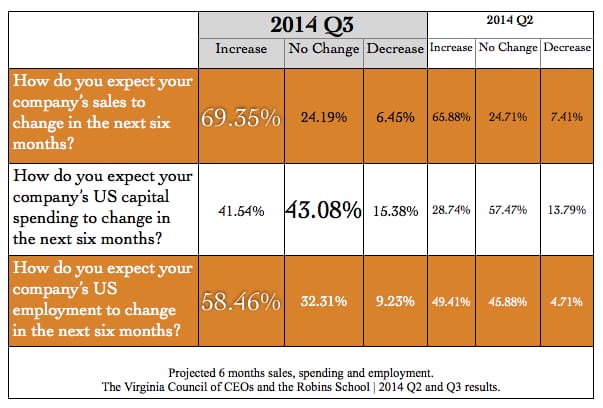
Economic Outlook Index
The results also provide an overall economic outlook index, which is based on businesses’ projected six-month sales, spending and employment figures.

About the 2014, Third Quarter Robins School of Business / VACEOs Economic Survey
The Virginia Council of CEOs and the Robins School jointly conduct the quarterly survey, which helps central Virginia companies anticipate business decisions and plan for growth. The Robins School adapted the survey from the Business Roundtable, an association of CEOs of American companies that conducts a similar survey nationally. The Council and the Robins School collected responses from 63 CEOs in central Virginia. The median annual company revenue year-to-date for CEOs responding was $3 million. Multiple industries are represented in the sample (for example, construction, manufacturing, finance and insurance, and retail). The median number of full-time employees for responding companies in this survey was 22.
Request Results
The council continues to expand the survey beyond its members, offering any area business owners whose companies gross at least $1 million in annual revenue the opportunity to participate. If enough businesses participate, the council will provide survey results by industry. Participation is free, and all participants will receive copies of the survey data. Business owners and CEOs who would like to participate in the next survey should contact Scot McRoberts at smcroberts@vaceos.org.
About the Virginia Council of CEOs
The Virginia Council of CEOs is a nonprofit organization, whose mission is to connect the CEOs of second-stage companies so they can learn from each other and grow their businesses. Learn more at www.vaceos.org.
About the Robins School of Business
The Robins School of Business is the only fully accredited, top-ranked undergraduate business school that also is part of a top-ranked liberal arts university. Bloomberg Businessweek ranks both the Robins School’s undergraduate and part-time MBA programs among the top 30 in the country in their respective categories. The school’s executive education division offers open enrollment courses and customized leadership development programs for individuals and businesses.
# # #
VACEOs Members Make RVA and INC 5000 Lists
The Virginia Council of CEOs was founded in 2000 by a group of small business CEOs who sought to connect and learn from other CEOs in the area. The goal was to find a forum to comfortably test new ideas, get “unstuck,” and think differently about their business.
The Council has evolved from its initial membership of 25 to more than 170 CEOs today who participate in monthly roundtable discussions, quarterly luncheons, peer learning meetings, and annual retreats.
Our members represent a wide range of industries and experiences. They are movers and shakers, and their companies are frequently spotted the news. We found them most recently within two prestigious “fastest growing” company lists.
Imagine the possibilities and the hurdles you could overcome if you had an exclusive network of company leaders like these as your Think Tank! Visit VACEOs membership to learn more.
Sources:
RVA 25: Researched by: Keiter / Richmond BizSense Staff (http://www.richmondbizsense.com/lists/?djoPage=view_html&djoPid=32702&djoPY=@pf62GIklfcms)
Inc 5000: (http://www.inc.com/inc5000/list/2014)
A Night of Scotch with Norm Brodsky (by David Bender)
EDITORS NOTE
VACEOs member David Bender met Norm Brodsky during the 2014 VACEO Annual Retreat. A lifelong entrepreneur, Brodsky has launched several successful businesses in his lifetime, including a three-time Inc. 500 company. In 1995, he began writing the enormously popular Inc. Magazine column “Street Smarts.” When he’s not starting new businesses or making new fortunes, he spends his time mentoring other entrepreneurs and attending speaking engagements, and he often appears on MSNBC.
During the 2014 VACEO Retreat, Norm held a Q&A breakout session in which he and his wife offered straightforward advice about financial strategy and employee management. Norm hosts an exclusive Scotch Night for business professionals each year at his waterfront home in New York. During the Casino Night, he graciously gave one seat away as a door prize, which Jo Ann Rossi won, and put another seat up for auction. The bidding process for that seat could be compared to the frenzy found on the floor of the New York Stock Exchange. Imagine 100+ onlookers yelling and cheering at each other and at the two highly motivated members separated themselves from the pack. Standing on a chair to clearly express his commitment, David’s very LARGE bid was ultimately accepted by Norm, who in a turn, also accepted Preston Herrington’s matching bid, with all proceeds going to VACEOs. The room exploded with joy. A truly great moment for all.
We asked David if he would share his Scotch Night experience with the group. This is his story.
##
You Might Wonder Why
You might wonder, why did I bid thousands to join an annual Scotch Night event hosted at a beautiful home in Brooklyn?
Was it to see how the other half lives? No, I’ve had enough of that. I thought every car was German and had a name that started with a “B” until I was 9 years old.
Was it to hobnob with the rich, if not so famous? Did I have an image of an angel investor wanting to put his money behind my invention sitting on my office floor, wondering how my brilliance has gone untapped all this time? Or did I expect an offer of a seven-figure salary to head one of his companies? There was no such fantasy or delusion.
Perhaps standing on a chair, refusing to be beat at an auction in a roomful of my white-collar CEO friends and peers was a motivating factor. It was a thrilling auction, and fun to be in the middle of the excitement. But as much as I do like to win when I put my mind to it, recognition was not something I was seeking.
There was, in fact, only one motivating factor in my bidding for the seat. Standing nearby was my great friend Eric Sundberg. You see, every year, Eric goes on an extended vacation to China or Australia, or some other far-off place. He visits huge conventions and world’s fairs. He uses frequent flyer miles to fly first class. He opens himself up to the unknown. He’ll go bungee jumping, zip-lining, jet boating, flying in a fighter plane, or on some other unique adventure. You see, he knows you have to CREATE the opportunity for unique experiences if you are to HAVE unique experiences.
So with that in mind, I decided to bid on Norm Brodsky’s Scotch Night.
The Trip
Dinner was scheduled for 6:00 p.m. on a Tuesday after a tour of CitiStorage (Norm’s business) at 5:15 p.m. I drove to New York late Monday night and stayed at my friend’s apartment in Manhattan; he was out of town, which worked out perfectly. I got in about 2:00 a.m. and awoke a few hours later to a 16th story view overlooking the Hudson and downtown.
The weather was good for walking – cool and cloudy – and the rain held off all day. Wanting to take advantage of the experience, my day included pictures with Minnie Mouse and Johnny Depp (wax) in Times Square, a tour of Toys “R” Us, lunch at Kobeyaki (a fast food Japanese food concept of which Norm owns a piece), and a tour of a submarine and an aircraft carrier. I also circled the entire perimeter of Central Park in a futile search for hot peanuts!
Norm’s Place
The taxi pulled up to the CitiStorage warehouse at 5 N. 11th Street in Williamsburg, a neighborhood in Brooklyn across the river from Manhattan. The eight waterfront acres underneath CitiStorage, owned by the Brodskys, are now worth in the ballpark of $200 million. The new owners of CitiStorage (as of May 5) will be moving out soon, and you can be sure the Brodskys will be relocating shortly, as well.
Norm gave a tour of the CitiStorage facilities, including one warehouse that is home to over 4.5 million boxes. He explained the concept of the “termination charge,” which is commonplace in the storage industry: if a customer wants to get a box OUT of storage, they have to pay two years’ rent. This makes customers very sticky and the company actually fairly recession proof. He showed us how they developed the first bar code systems for the boxes and the files inside and told of the 3,000 movements of documents in and out of the facility each day. Paper and x-ray scanners are used to send requested files to customers – all in all, not a terribly fancy or complex operation on the surface.
An elevator took us to an office space belonging to Norm and Elaine, where I replaced an engraved piece of lathed pine hanging on the wall behind his desk with a new Louisville Slugger from the Council with the inscription “Norm Brodsky: Friend of the VACEOs.”
Norm (see, I call him “Norm”) told of how his lawn guy at his house in Telluride gave him the tip to buy real estate and put up an extended stay hotel in North Dakota to take advantage of the new oil boom. “Most money I’ve made,” is how Norm he described it. (By the way, the tip from the lawn guy was preceded with the question, “Is it true that if someone gives you a tip on a business then you cut them in for a piece of the profits?”)
Then it was up to his apartment overlooking the river – a spacious open loft layout with about 25 bottles of Scotch on a round table and glasses inscribed with “Norm and Rob’s Scotch Night” ( Rob Levin, publisher and founder of New York Enterprise Report, was the co-host of the event). It was only after I lamented leaving my souvenir glass the next day that I realized they were not, in fact, souvenirs, so it was good that I forgot mine.
There was about 15 minutes of mingling before Norm called everyone to order and the 17 or so guests circled around the table of Scotch for introductions. Other than a couple of clear regulars, invited guests ranged in age from late 20s to mid 50s. Each had a turn to puff their chest and brag about the companies they run, ran, bought and sold. So I listed all of mine, and included a mention of the invention sitting on my office floor. I think it went something a little like this: [gorilla grunting and chest-pounding].
It was an impressive rundown, to be sure. No heads of Top 1000 companies, but the gamut ran from the owner of a $250,000 dumpster business to a gentleman who had just sold his coal mine and was looking for his next project. There was duo from Michigan who run a marketing company in addition to four other companies, a lawyer with a (very) private equity firm, the head of a 200-employee test prep firm, and the owner of a private jet leasing company and several top-end meeting facilities. Also attending were an individual involved in political consulting and a director within the Inc. Business Owner’s Council.
The company was great, the conversations lively, the egos big and small (generally inversely proportionate to age, but not without exception), and plenty of advice was given and received (including one tip that certainly made the trip financially worthwhile). We had terrific Scotch and a delicious dinner, all overlooking the unfettered nighttime skyline of New York City. I finished off the night back at my friend’s apartment falling asleep to a “pre-Mark Cuban years” episode of Shark Tank.
There was one person with whom, to be sure, I made what I hope is a lifetime connection. We were able to talk almost non-stop and had a remarkable number of things in common, including:
· Owning businesses of similar size in terms of employees and production and customer service issues
· Wanting to find ways to create unique customer and employee experiences
· Possessing a genuine concern for the people in and around our business
· Having a father pass away from cancer as a teenager
· Having a spouse who didn’t understand why we wanted to go to this dinner.
We also talked about our young kids and shared a genuine enthusiasm for going on board a submarine and an aircraft carrier while visiting New York City. In case you haven’t figured it out, the most valuable thing I took from my trip to New York was a bond with my traveling companion, Jo Ann Rossi. I am grateful to the Council for giving me the opportunities it has to make connections with people such as Eric and Jo Ann, and that’s not something you need Scotch or prime rib to appreciate.
Personal Productivity for the CEO
Bob Piazza knows productivity. He ran HR for a Fortune 200 company and now teaches at the Robins School of Business. He shared his Five Guiding Principles for Personal Productivity at a recent Council workshop.
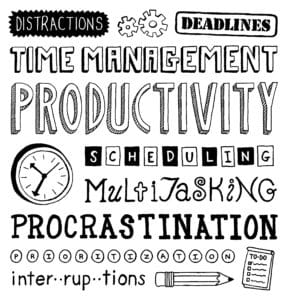
You should take a class from Bob, or hire him to consult with you, to really benefit from his experiences.
Here are a few take-aways from Bob and the CEOs who were part of the conversation.
• Daily planning is critical, or else you will be chasing squirrels all day (the Golden Retriever Syndrome).
• Schedule three times a day to process and respond to email. (Turn off email notifications!)
• Schedule a buffer day after vacations and long trips away. Use the time to process email and plan for re-entry.
• When writing a critical email (key person, difficult situation, etc.) always save a draft, step away, and review it later before sending it.
• Utilize a coach to help you focus on your planning rhythm, simplification of processes, and accountability.
And, here’s an article from Inc. Magazine with unconventional ways to be more productive.
Culture Eats Strategy For Breakfast
The statement above is attributed to business guru Peter Drucker. I don’t think Drucker wanted to diminish the importance of strategy, but instead wanted to dramatically illuminate how little focus most managers pay to corporate culture. There are some firms where culture drives strategy – or at least is a primary strategy. Think Zappos, Disney, and RVA’s own Snagajob.
In fact, culture is a strategy at the Virginia Council of CEOs. We call our culture “Safe Haven” and it means that our members and sponsors participate in the Council to learn from, and share with, one another. Further, we respond to others when they ask for the benefit of their experience. To make it easier for folks in the Council to do this, we just launched a new HAMO (Help A Member Out) tool.
Both culture and strategy are on the agenda for our CEO Retreat next month. I am always inspired to think differently by the smart people we bring in for a few days each April.
And, on May 8, Caroline Hipple, former CEO of Storehouse, will speak at our quarterly meeting from her new book A Pathway to Profit: Culture Impacts Performance. Hipple will share how she led a struggling company to profitability through cultural transformation.
So, here’s to culture, and to strategy. Give me a shout if you would like to discuss either.
– Scot McRoberts, Executive Director

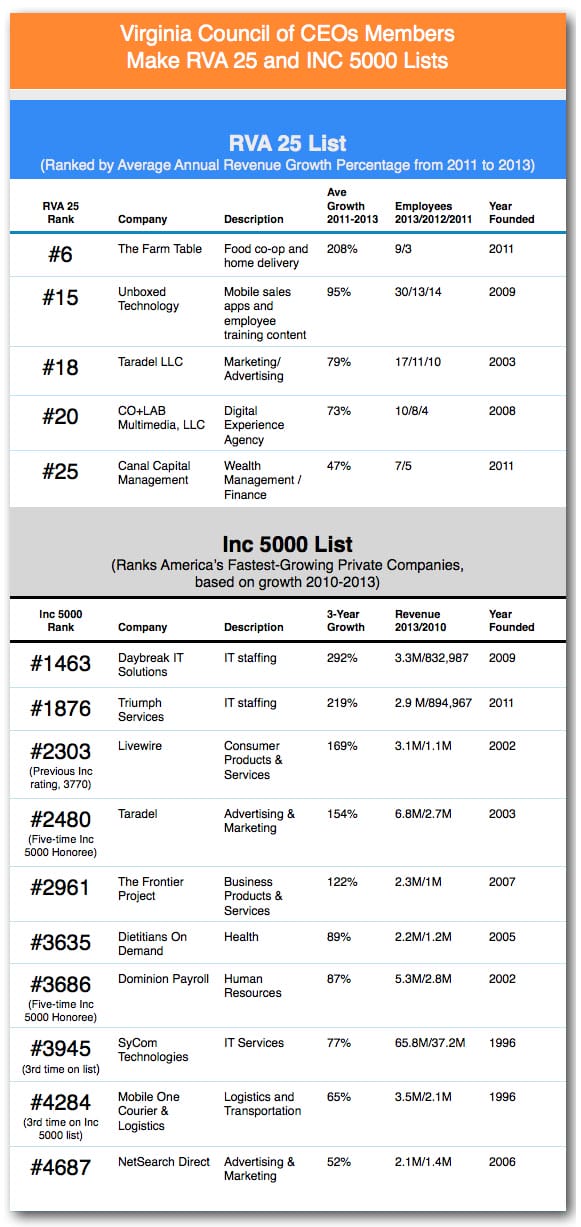
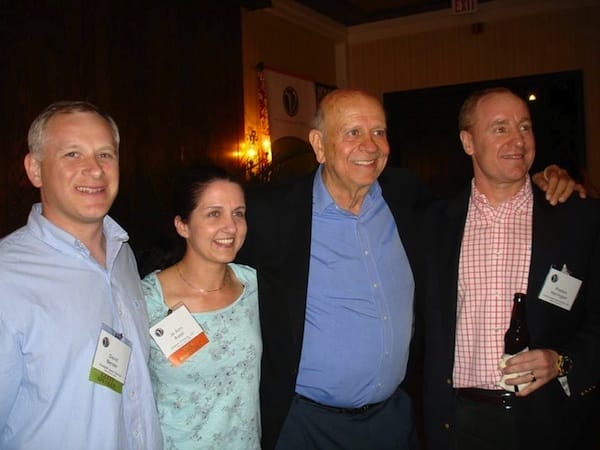
Recent Comments